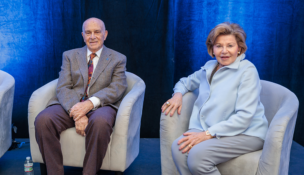The Welch Way
Jack Welch walks gingerly on stage at the MGM Grand Hotel and Casino in Las Vegas, but his deliberate pace doesn’t mean the 78-year-old management icon is slowing down. Nor has he mellowed since retiring as chairman and CEO of General Electric Co. in 2001. Thirteen years have elapsed since his 20-year reign at GE, but Welch remains a commanding presence.
He divides his time as a management consultant to dozens of companies and as an instructor at the Jack Welch Management Institute (JWMI) at Herndon-based Stayer University, part of Strayer Education Inc. The for-profit private school bought Welch’s leadership catalog – known as the Welch Way – in 2011 from Ohio-based Chancellor University for $7 million, with Welch covering about 30 percent of the cost. Strayer officials say the portfolio provides busy execs with a cheaper alternative to pricey MBA schools.
Welch has always been, and remains, a controversial figure. Adherents admire his no-nonsense style at GE, especially his relentless focus on getting rid of underperforming businesses. That approach enabled GE to consistently meet expected earnings, although critics like to point out that’s due in part to 100,000 jobs getting slashed during his Welch’s tenure.
“Welch argues that his system is similar to grading on the curve in schools, which is precisely correct. And there is abundant research evidence that forced ranking in schools is bad for learning,” says Jeffrey Pfeffer, a Stanford University business professor.
More recently, Welch engaged in a high-profile dustup with Fortune magazine over comments he made in the run-up to the 2012 presidential election. Welch insinuated, in a now-infamous tweet, that the U.S. Bureau of Labor Statistics had manipulated monthly jobs statistics to benefit President Obama’s re-election bid. “Unbelievable jobs numbers…these Chicago guys will do anything… can’t debate so change numbers,” Welch wrote on Oct. 5, 2012. The comment sparked a media backlash, most specifically at Fortune magazine, where Welch had been an occasional contributor. The criticism prompted Welch to abruptly quit his gig as a columnist for Fortune.
On this day, however, several hundred people have packed an MGM ballroom to hear Welch speak at the kickoff of an April business conference by software vendor Skillsoft Corp. of Nashua, N.H. (Welch serves as a Skillsoft director). After a brief introduction, moderator Tracey Matisak begins firing a series of leadership-related questions at Welch, mostly based on his New York Times best-seller, “Winning.”
Outside the ballroom, the slot machines in the nearby casino are humming. Inside the ballroom, however, is a sense of anticipation as Welch addresses Matisak’s first question: What does innovation look like?
Not content with abstractions, Welch particularizes his response. “Innovation means finding a better way every day. It means rewarding every little improvement along the way. Cumulatively, they make every company better.”
Innovation can originate anywhere within an organization, yet employees tend to believe “it’s somebody else’s job to innovate, not mine” – a fault Welch places squarely at the feet of senior leaders. “Innovation means engaging every mind in the organization. Don’t let innovation scare you. Company after company makes that mistake.”
In “Winning,” Welch argues for the “absolute necessity of candor in every aspect of management” – letting employees know where they stand, even if the news is unwelcome. Candor factors heavily in differentiation, a management philosophy he popularized while transforming GE into a conglomerate whose market cap at his departure approached $500 billion.
Welch says his critics are wrong. He likens differentiation to what happens before a sandlot baseball game. The most athletic kids get picked first, the second stringers work harder to get in the game, while others find pursuits more in line with their aptitude and abilities.
“[Cando is] about getting at the truth, which is a big deal in the business world. I’ve heard managers say, ‘I can’t tell someone they stink.’ Those people are wimps.
“You have no right to be a manager,” he adds, “if you can’t let people know where they stand. Employees should never come to work wondering.”
Asked to describe an effective leader, Welch lists several key characteristics. “You have to become the ‘chief meaning officer’ – making it clear to every person what the company is doing and why are there.”
In addition to being open and honest with employees, a leader’s job is akin to a sweeper in curling. “You’ve got to get all the crap out of the way so people can really flourish.”
Good bosses also have a “generosity gene” and “love to give raises and give credit for good ideas.” Nothing is more disengaging to an employee, Welch says, than when a boss takes an employee’s idea and pawns it off as his own. “Kissing up and kicking down is not a winning strategy,” Welch says.
Welch also takes issue with company-sponsored mentoring programs, which many organizations use to help high-potential employees advance their careers. “I’m probably going to offend some of you by saying this, but mentoring is the biggest jerk program of the year. What if the mentor you assign to the employee is a horse’s ass? You should look at everyone in your organization as a [potential] mentor.”
Near the end of his hour-long discussion, Welch switches gears to highlight the JWMI-Strayer merger, which closed in 2011. Welch helps develop the curricula and provides instruction to each class via video hookups. “We’re very proud that 70 percent of our MBA students have earned raises or promotions after graduating. ’’
At a poolside reception several hours later, Dean Sippel, JWMI’s senior vice president and general manager, says adding “the Welch way” catalog has been a boon for its 650 students, who typically average 15 years of work experience. “It gives them hands-on training vs. just theory. The philosophy is: ‘Learn it today, apply it tomorrow,’” Sippel says.
As Welch was speaking in Las Vegas, JWMI grad John Boling was in Virginia, putting what he learned into practice on the job. Boling says the Welch course work enables him to interact on a higher level with lawyers, policymakers and businesspeople in his job as a lobbyist for the Council of Producers and Distributors of Agrotechnology, a trade group.
The 45-year-old Boling, who is married with three kids, earned his MBA at Strayer in less than two years. Being able to work around his schedule and complete the degree in a relatively quick time period was a huge advantage, he says. The best part was being able to directly ask questions of Welch during video classroom sessions.
“Jack didn’t just answer my questions – he challenged me by asking me how I was going to put it in practice,” Boling says.
F

















